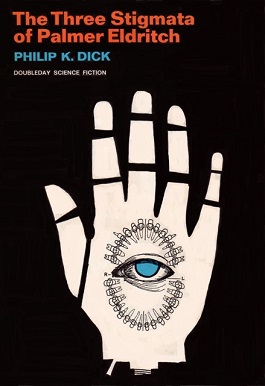
The Three Stigmata of Palmer Eldritch is a 1964 science fiction novel by American writer Philip K. Dick. It was nominated for the Nebula Award for Best Novel in 1965. Like many of Dick's novels, it utilizes an array of science fiction concepts and explores the ambiguous slippage between reality and unreality. It is one of Dick's first works to explore religious themes.

Damon Francis Knight was an American science fiction author, editor, and critic. He is the author of "To Serve Man", a 1950 short story adapted for The Twilight Zone. He was married to fellow writer Kate Wilhelm.

James White was a Northern Irish author of science fiction novellas, short stories and novels. He was born in Belfast and returned there after spending some early years in Canada. After a few years working in the clothing industry, he worked at Short Brothers Ltd., an aircraft company based in Belfast, from 1965 until taking early retirement in 1984 as a result of diabetes. White married Margaret Sarah Martin, another science fiction fan, in 1955 and the couple had three children. He died of a stroke.

Orphans of the Sky is a science fiction novel by American writer Robert A. Heinlein, consisting of two parts: "Universe" and its sequel, "Common Sense". The two novellas were first published together in book form in 1963. "Universe" was also published separately in 1951 as a 10¢ Dell paperback. The work presents one of the earliest fictional depictions of a generation ship.

The Dragon in the Sea (1956), also known as Under Pressure from its serialization, is a novel by Frank Herbert. It was first serialized in Astounding magazine from 1955 to 1956, then reworked and published as a standalone novel in 1956. A 1961 2nd printing of the Avon paperback, catalog # G-1092, was titled 21st Century Sub with the previous title in parentheses, and a short 36 page version of the novel was later collected in Eye. It is usually classified as a psychological novel.
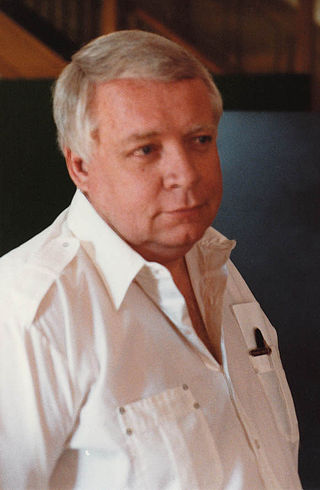
Algirdas Jonas "Algis" Budrys was a Lithuanian-American science fiction author, editor, and critic. He was also known under the pen names Frank Mason, Alger Rome in collaboration with Jerome Bixby, John A. Sentry, William Scarff, and Paul Janvier. In 1960, he authored Rogue Moon, a novel.

Lester del Rey was an American science fiction author and editor. He was the author of many books in the juvenile Winston Science Fiction series, and the editor at Del Rey Books, the fantasy and science fiction imprint of Ballantine Books, along with his fourth wife Judy-Lynn del Rey.
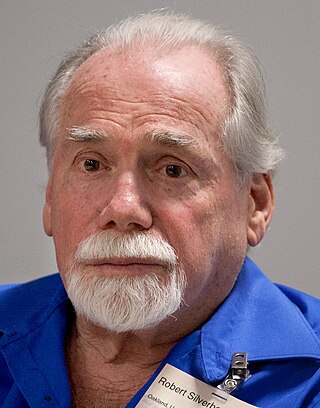
Robert Silverberg is an American author and editor, best known for writing science fiction. He is a multiple winner of both Hugo and Nebula Awards, a member of the Science Fiction and Fantasy Hall of Fame, and a Grand Master of SF. He has attended every Hugo Award ceremony since the inaugural event in 1953.
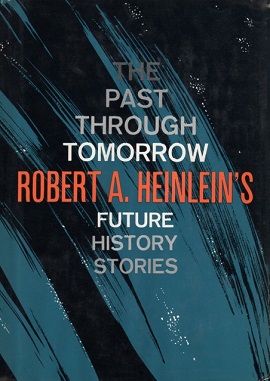
The Past Through Tomorrow is a collection of science fiction stories by American writer Robert A. Heinlein, first published in 1967, all part of his Future History.
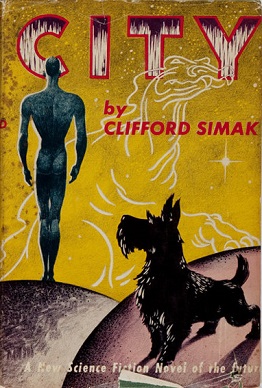
City is a 1952 science fiction fix-up novel by American writer Clifford D. Simak. The original version consists of eight linked short stories, all originally published in Astounding Science Fiction under the editorship of John W. Campbell between 1944 and 1951, along with brief "notes" on each of the stories. These notes were specially written for the book, and serve as a bridging story of their own. The book was reprinted as ACE #D-283 in 1958, cover illustration by Ed Valigursky.
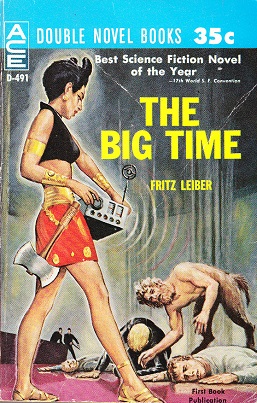
The Big Time is a short science fiction novel by American writer Fritz Leiber. Awarded the Hugo Award for Best Novel or Novelette in 1958, The Big Time was published originally in two parts in Galaxy Magazine's March and April 1958 issues, illustrated by Virgil Finlay. It was subsequently reprinted in book form several times. The Big Time is a story involving only a few characters, but with a vast, cosmic backstory.
"Neutron Star" is an English language science fiction short story by American writer Larry Niven. It was originally published in the October 1966 issue of Worlds of If. It was later reprinted in the collection of the same name and Crashlander. The story is set in Niven's fictional Known Space universe. It is notable for including a neutron star before their existence was widely known.

Time and Stars is a collection of science fiction short stories by American writer Poul Anderson, published in 1964.

"If There Were No Benny Cemoli" is a science fiction short story by American writer Philip K. Dick, first published in the December, 1963 issue of Galaxy magazine with illustration by Lutjens.
Thomas L. Sherred was an American science fiction writer.

Norstrilia is a science fiction novel by American writer Paul Linebarger, published under the pseudonym Cordwainer Smith. It is the only novel he published under this name, which he used for his science fiction works. It takes place in Smith's Instrumentality of Mankind universe, and was heavily influenced by the classic Chinese novel Journey to the West. The novel is in part a sequel to Smith's 1962 short story "The Ballad of Lost C'Mell", featuring some of the same characters and settings.

Past Master is a science fiction novel by American writer R. A. Lafferty, first published in 1968. The novel follows the attempt of a future Utopian society in preventing its decline, by bringing Sir Thomas More to the year 2535.

The Falling Torch is a 1959 science fiction novel by American writer Algis Budrys. A 1999 Baen Books edition was very slightly rewritten, and includes one entirely new chapter.

The Watch Below (1966) is a science fiction novel by British writer James White about a colony of humans stranded underwater in a sunken ship, who survive by air pockets, and a water-breathing alien species in search of a new home. The two generation ships encounter each other in the Earth's ocean.

Alpha 2 is a science fiction anthology edited by Robert Silverberg, first published as a paperback original by Ballantine Books in November 1977. No further editions have been issued. .

















